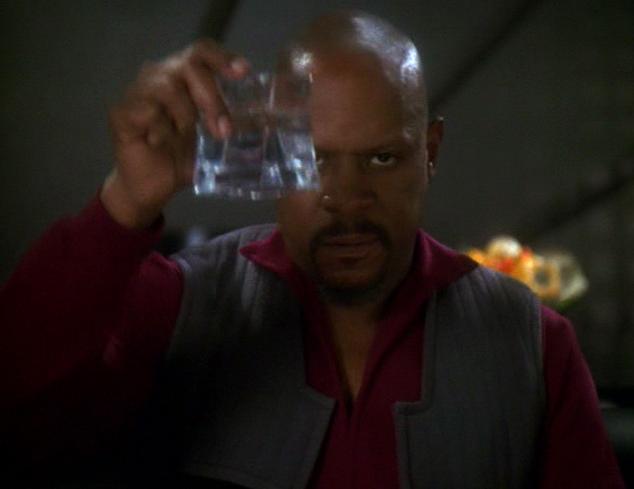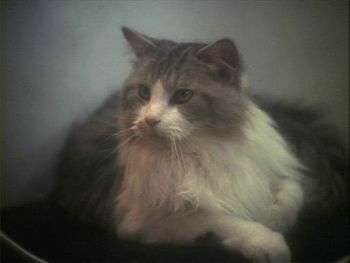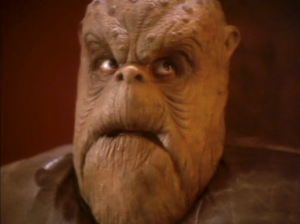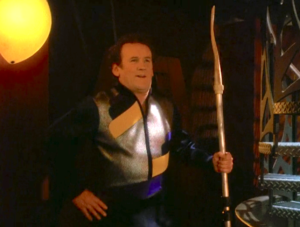 S6E16, “Change of Heart” (Ronald D. Moore)
S6E16, “Change of Heart” (Ronald D. Moore)
A few lessons can be drawn from “Change of Heart.” One, when you and your spouse go on dangerous away missions together, it’s more than an HR nightmare, it can severely compromise your chances of successfully completing the mission. Two, for all his grousing, Worf sure loves Dax. He loves her more than completing missions! More than doing his duty or preserving his honor. More than PRUNE JUICE EXTRA LARGE? Probably, thought he is not forced to choose between them…this time.
Their relationship has been complicated from the start but I think it’s safe to say “Change of Heart” assures us that it’s going to take. This is probably the quintessential Worf & Dax episode really, probably even moreso than their wedding episode, which had them scrapping until they decided not to. This one is more touching and heartfelt, and the consequences more serious.
It also gives us a chance to have them working together and not just endlessly talking about their relationship. Both are badass soldiers and can be sent into hostile territory to liberate spies. But Dax is the funny one. I mention that Worf is funny quite a bit, but he hasn’t shown much of it since he got married. Somehow the usual subtle menacing irony that generates his sensible chuckles doesn’t really pair well with Dax’s jokes. I mean, her jokes are jokes, they are meant to be funny in an absolute sense, whereas Worf’s is more relative, playing off his typical icy demeanor. When Dax gets injured in the foreboding wilderness she’s still cracking jokes. Haha, you sure are dying in this hellish nightmare jungle. But they have to find their spy Lasaran, who has vital information about all the secret Founders in the Alpha Quadrant, and spring him or he’s going to get re-captured and very bad things will happen to him. But Dax’s condition deteriorates and Worf can’t risk her dying, so he has to abandon the mission and get her back to safety, even if it means they won’t get the vital information and poor Lasaran will never be heard from again.
Most of the Ronald D. Moore episodes have been brilliantly written and we can add this to the pile. It’s about fear in so many ways. Fear of Dax dying, fear of Lasaran getting captured, fear of not completing an incredibly vital mission that’s going to set back a brutal war even further. But how can Worf not save her? Of course he has to. It also changes up the usual cliché of everything working out in the end. If this was a movie, that’s what we’d expect. Dax lives but everything is most certainly not resolved with a neat little bow.
Meanwhile in the most frivolous B-story yet, Julian decides to use his super brain to beat Quark at tongo. But it turns out he maybe should try chess or something because you also need to be cunning, and he loses. Eh, he probably got what was coming to him. I know it’s the B-story and it doesn’t matter but wow, this one really has nothing going for it. It peters out halfway through the episode and unlike the main story, ends exactly how you’d think it would. The Calvinball-esque intricacies of Tongo certainly aren’t interesting enough to carry it. Memory Alpha tells me Ronald Moore wanted to avoid the mistake he made back in “Life Support” with a really silly B-story about Nog being a bad date getting paired with…Bareil’s death. So he just ended it early and left it behind for the climax. No one dies this time (well, uh, sorry Lasaran) but I’m not really seeing this as a better solution. Maybe just don’t even bother with such meager padding? Maybe we could learn a bit more about Lasaran or something to make Worf’s choice feel even tougher?
Overall: The pointless B-story costs an otherwise excellent episode a bit, but this is a very good one. 4 out of 5.
S6E17, “Wrongs Darker Than Death or Night” (Ira Steven Behr & Hans Beimler)
An all-around uncomfortable episode full of implied rape and brutal wartime choices. Ick. Will definitely need a Nog & Jake palette cleanser soon.
On what would have been Kira’s mother’s 60th birthday, somehow Dukat pipes in a spam call to Kira’s quarters to claim that he knew her. In fact, he chooses now to boast that she’d left Kira’s father for him and had a long relationship with her. Naturally this is unsettling and seems unbelievable from the currently-insane Dukat. But he knows enough details about her mother that she can’t ignore it. So she uses a Bajoran time orb to go back and find out the truth.
A couple of stupid quick points before I discuss further:
- Do they not have telemarketers or other spam phone calls in the future? When Dukat’s transmission comes in, there’s no identifying information. Kira answers it anyway. I’m vaguely remembering the plot of Demolition Man where they live in a society without murder, then a 20th century killer comes out of stasis and goes on a rampage. The police never deal with murders anymore, so they’re too tame and unprepared to do anything about it. They thaw out Sylvester Stallone, a hardened 20th century cop, to deal with it. Maybe there should be a Trek where 24th century hucksters re-discover telemarketing and they need to go back in time to get any random person to help them learn to ignore the spammy detritus of daily life. Star Trek IV but super tedious.
- Sisko puts up some weak resistance to Kira using the usually-forbidden powers of time travel to solve a personal mystery. The ethics of this probably ought to have been a much bigger deal, if not a whole episode. But, well, OK. Except it is never clear in what capacity Kira goes back. Is she inhabiting someone else, Quantum Leap style? Or is she, Kira, really there? If so, why wouldn’t Dukat have been really confused when he got to know real Kira later in life? Is she changing things, or is this how it actually happened? K theorized Dukat may bring it up in the future, as he’s already worked out what really went down. Maybe? I gather the real answer is that we aren’t supposed to think about any of this too much.
Anyway, Dukat’s story turns out to be true in fact, if not in spirit. Meru does leave her family for him, but she’s coerced. Memory Alpha says this makes for an ambiguous story where there is no clear right answer on how to interpret Meru’s actions, or how Kira should think of her. I don’t agree. It’s not unclear: Dukat is an especially cruel bastard and I regret ever thinking he might have had a good side that just needed the right non-wartime circumstances to emerge. Meru was trapped and I don’t think it matters what choice she makes. It’s awful choice A or awful choice B, and it’s not her fault she even has to pick. She doesn’t deserve any judgement. It’s all on Dukat and it doesn’t matter that he’s “nice” to her.
So I guess yeah, this is an effective story, if needlessly cruel. It makes Dukat even sleazier. Maybe we need to wring out any last bits of sympathy for him lest we slacken our hatred of him for losing his daughter and his mind. I’m fully ready for them to capture him and toss him into the wormhole without a spacesuit.
Overall: 3 out of 5 and I need a shower.
S6E18, “Inquisition” (Bradley Thompson & David Weddle)
Well it wasn’t a Nog & Jake scheme but it was a pretty great episode. SF mind-twisters are more the domain of TNG but “Inquisition” is an instant classic in the mini-genre, I loved it. (I guess it’s weird to call something an “instant classic” in this context—it is, to me, but this aired 21 years ago.)
A Federation inquisition shows up and claims to be deep into a security investigation into senior staff on DS9. It disrupts Julian’s vacation work conference and, worse, keeps him from getting his breakfast. But it turns out to be much worse, the investigation is all about Julian, taking a very conspiratorial view of some of the previous Bashir episodes. The mysterious Federation investigator, Sloan, has essentially already convinced himself all of Julian’s actions could easily be seen as exactly what a secret agent would do. The precise details aren’t wrong, but intent is impossible to prove, and Bashir can’t seem to unsnarl himself. It seemed especially dire at times, knowing that it hinged on Julian’s genetic modifications, and the fact that he got off rather lightly when he was initially found out. I always bring up the TV problem where they can’t usually just erase key characters, hence we know Julian’s going to worm out of this. So they have to find tricks to make us buy into danger, and I totally bought it this time. Why couldn’t Julian’s situation come back around to bite him? Why couldn’t he spend the rest of season 6 in jail? Even if he makes it out in the end again, it does bring up the fairly painful realization that he did lie to Sisko about himself for years.
This one was highly enjoyable to work through. Cleverly written, with at least three twists. Bashir and Sloan’s final conversation is fantastic. Very thematically on-brand for the show as a whole—Julian asks how Section 31 can justify illegal actions for great good, which is thrown right back in his face. Julian is, himself, illegal. Would the patients he’s saved over the years care? (Would O’Brien want his shoulder re-separated?) If there’s one overarching theme for DS9 it’s that the ends justify the means. Brilliantly directed (Michael Dorn!). Everything just feels a little off and we don’t know if it’s a dream or what. (DS9 has also gradually introduced the idea that anyone can be a Changeling, but wisely they don’t dip into that well too often.) Also Sloan’s character needed a really excellent performance and they probably blew their production budget to get William Sadler. Worth every penny. But I think the best idea here is this re-framing of previous episodes from a totally paranoid point of view. It’s fun & easy to develop fan theories as you watch a show like this, and if they happen to circumstantially fit the facts, it’s pretty fun, even if they never turn out to be true. It’s certainly possible Julian was somehow converted into an agent so deep he didn’t himself know he was an agent.
We also now have a possible series exit lined up for Julian. Knowing we are just over one season from the end of the show, they might be starting to set things like this up.
Overall: 5 out of 5.
S6E19, “In the Pale Moonlight” (Peter Allan Fields/Michael Taylor)
It’s become clear the war against the Dominion will be tough to win for the Federation alliance. If only they had more help, like say, if there was one more uninvolved race that could jump into the fracas and help out. Maybe if they were cold and calculating and kinda evil it would help. Well, whaddya know, there is: the Romulans, and so far they have been sitting on the sidelines, ostensibly waiting to see who it was worth aligning with, i.e., who was going to win. How to convince the Romulans to join them and tilt the balance? Only why should they get a bunch of themselves killed when, instead, they could not do that. The kind of convincing necessary is beyond the ambassadorial and negotiation skillz of Sisko, they need to play dirty.
I liked when they hit that point of the episode because we didn’t know which of (at least) three characters Sisko could call on for such services. Nog? Odo? Quark? It’s more or less why they keep Quark and his vaguely illegal enterprise around, but when it comes down to it he’s more of a prankster or a thief. He can hack computers and break into stuff and knows plenty of shady guys, but this is a job for someone with experience in espionage and doesn’t mind if a few bodies get left behind. It’s a job for Garak.
Even Garak can’t do it alone, though, and this episode is mostly Sisko being dragged down into the real shady underbelly of politics. It’s also some variation of “Statistical Probabilities” where the calculations say you win with some collateral damage, or lose outright. Well, there’s no choice there, really. Someone smarter than me could parse the philosophical ramifications of letting a career criminal and a snotty Romulan bureaucrat die if it means winning a war for your quadrant, but my feelings are generally, yep, let’s do it. Especially if you can mostly blame Garak.
Another excellent one, highlighted by terrific Avery Brooks and Andrew Robinson performances. Well-framed within Sisko confessing his descent into an ultimately deleted log record, and intricately plotted throughout. Memory Alpha tells me that it might be the most antithetical to Gene Roddenberry’s vision. I suppose there’s an argument for that, but Kirk’s been violating the Prime Directive for 50 years, so, I don’t know. I think DS9 is a much more mature show that anything G.R. was involved with, and this is one of the best episodes of the series because of it.
Overall: Pouring one out for Vreenak, and Sisko’s soul. But if you want to make an omelette, etc. 5 out of 5.


